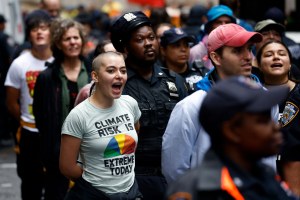But a majority of Americans support efforts to mitigate its effects.
Climate change has affected the lives of every American in some way, yet it is a highly polarizing and divisive issue. The 2023 Chicago Council Survey, conducted September 7–18, 2023, finds strong partisan divisions in threat perceptions posed by climate change, the importance of leading the global effort against it, and the proper level of attention US leaders should give to the issue. However, despite these differences, the overall population rallies behind climate-conscious business practices and globally equitable climate policies.
Key Findings
- Five in 10 (52%) Americans see climate change as a critical threat to the vital interests of the United States in the next 10 years.
- Seventy-five percent of Americans feel it is somewhat or very important for the United States to be a world leader in combating climate change.
- A strong majority of Americans (70%) favor making businesses operating in the United States pay for modifications in their operations to make them more environmentally sound. Most also favor mandating other business practices, like paying for recycling (69%), only producing recyclable packaging (68%), and sealing methane gas leaks from oil wells (82%).
- Most Americans would support the provision of humanitarian aid (84%), economic aid (60%), disaster relief (80%), and climate-resilient investments (59%) to countries disproportionately affected by climate change but are roughly split on support for accepting climate refugees (51%).
- Republicans and Democrats are highly divided in their attitudes toward the threat of climate change, the importance of being a global leader in the effort to combat it, and the level of attention given to it by US leaders.
Republicans and Democrats Are Divided on Perception of Threat Posed by Climate Change
In 2023, the United States has experienced a record 23 weather- and climate-disaster- related losses exceeding $1 billion each. Yet when it comes to possible threats to the vital interests of the United States in the next 10 years, Americans rate climate change lower than cyberattacks (72%), weakening democracy in the United States (69%), and political polarization (61%). At present, 52 percent of Americans say climate change is a critical threat. However, a closer look at the data shows that the public’s perception of climate change as a threat differs significantly between Republicans and Democrats.
Eight in 10 Democrats (82%) see climate change as a critical threat, while just 16 percent of Republicans see it the same way; Independents meet them in the middle, at 51 percent. This is the greatest partisan divide (a difference of 66 percentage points) in the perception of the threat posed by climate change ever noted in a Chicago Council Survey.
In the last nine years, the partisan gap has grown by 27 percentage points, in part because of a heightened sense of concern for climate change among Democrats. Since 2014, the percentage of Democrats who see climate change as a critical threat has steadily increased, growing by about 31 percentage points; it is also now at its highest level since 2008. By contrast, the percentage of Republicans who think climate change is a critical threat to the United States has only increased by 4 percentage points over the same time.
In a separate question that presented five items that could pose a threat to humanity, three in 10 Americans said climate change (30%) is the most concerning threat—a close second to nuclear war (37%). Fewer consider a deadly virus (16%), artificial intelligence (14%), or an asteroid striking Earth (2%) as the most concerning threat to humanity.
Partisan divisions are seen in perceptions of the threat to humanity posed by climate change. Half of Democrats (50%) are most concerned about the threat to humanity posed by climate change compared to only 9 percent of Republicans, a 41-percentage point difference. On the other hand, 50 percent of Republicans are most concerned about the threat of nuclear war to humanity versus 27 percent of Democrats. Like Republicans, Independents are more concerned by the threat of nuclear war (36%) than climate change (29%).
Americans Look to the United States to Lead the Global Effort against Climate Change
Five in 10 (50%) Americans feel it is very important for the United States to be a world leader in combating climate change, while 24 percent feel it is either not very important or not important at all. Republicans are far less likely to view climate change as a very important issue for the United States to lead on (18%), compared to eight in 10 Democrats (79%) and half of independents (50%).
By contrast, Republicans are more likely to say it is very important for the United States to be a world leader in military strength (82%), economic strength (77%), and manufacturing (62%). Ultimately, Republicans consider combatting climate change to be the least important space for the United States to lead in, while Democrats see it as the most important priority for US leadership (see appendix).
All the while, most Americans (55%) say US leaders aren’t giving the issue of climate change enough attention. Democrats are the most likely to say so (83%), and a majority of Independents agree (56%). On the other hand, Republicans are the most likely to say US leaders are giving the issue of climate change too much attention or about the right amount (58% and 20%, respectively).
Strong Support for Climate Mitigation Measures, Though Lower among Republicans
Most Americans see climate change as a critical threat to the interests of the United States and feel it is important for the United States to be a world leader in combating climate change. Accordingly, majorities of Americans favor policies that might reduce the effects of global climate change and prevent further environmental degradation. When asked if they would favor or oppose various proposals to reduce the effects of global climate change, Americans strongly favored making businesses modify their operations to be more environmentally sound (70%). This includes paying for recycling (69%), as well as requiring businesses to only produce recyclable packaging (68%) and seal methane gas leaks from oil wells (82%).
However, it is important to note that the question phrasing did not explicitly mention the higher costs to consumers that may be associated with more environmentally friendly business practices. It is possible that if tradeoffs were mentioned in the question phrasing, support for the measures among Americans could be lower.
Other surveys have also highlighted how the phrase “climate change” can be polarizing and, as such, impact the opinions of respondents on environmental policies. To test this hypothesis, we asked two versions of this question and randomly assigned half of the survey sample to each.
When the question replaced the phrase “climate change” with “environmental degradation,” nearly all Americans favored the adoption of these business practices, and few differences in responses were noted.
While minor, the greatest differences across question wordings are found among Republicans, who are more likely to favor the policies if they were to reduce further “environmental degradation” rather than combat global “climate change.” For example, “to reduce the effects of climate change,” 68 percent of Republicans favor requiring fossil fuel industries to seal methane gas leaks versus 74 percent who favor this policy “to prevent further environmental degradation.”
Americans Back Climate Equity Overall, but Parties Divided on Policy
American support for climate-conscious policies doesn’t stop there: majorities support policies that would alleviate the effects of climate change on countries disproportionately affected by it. Most Americans support the provision of humanitarian aid (84%), disaster relief services (80%), and economic aid (60%) to climate-vulnerable countries. The majority of Americans also support investments in climate-resilient infrastructure (59%) and accepting refugees (51%) fleeing from climate crises, though at lower levels.
Across the board, majorities of Democrats and Independents support these policies, except for accepting climate refugees, where Independents are evenly split. Meanwhile, the majority of Republicans oppose providing economic aid, investing in climate-resilient infrastructure, and accepting climate refugees (61%, 64%, and 73% respectively). Democrats are nearly three times more likely than Republicans to support accepting climate refugees and are more than twice as likely to support investing in climate-resilient infrastructure.
Conclusion
Across the board, Americans are divided along partisan lines in their perception of the threat posed by climate change, the importance of leading the global effort against it, and the amount of attention US leaders should give to the issue. For most Democrats, climate change poses the greatest threat to humanity and demands the United States’ utmost attention and leadership in combating it. By contrast, Republicans are far more concerned about the threat of nuclear war and find it more important for the United States to be a leader in economic and military strength. The data also show that Democrats are driving partisan divisions in attitudes toward climate change, as they have become steadily more alarmed than Republicans, whose attitudes have remained relatively stable, over the last ten years.
Despite these differences, the overall population supports proposals to make businesses in the United States more environmentally friendly and aid countries disproportionately affected by climate change. That means that ahead of COP28, or the 2023 United Nations Climate Change Conference, the United States has the public’s support to work with global partners to increase climate ambition and ensure strong environmental outcomes.
This analysis is based on data from the 2023 Chicago Council Survey of the American public on foreign policy, a project of the Lester Crown Center on US Foreign Policy. The 2023 Chicago Council Survey was conducted September 7–18, 2023, by Ipsos using its large-scale, nationwide, online research panel, KnowledgePanel, in both English and Spanish among a weighted national sample of 3,242 adults 18 or older living in all 50 US states and the District of Columbia. The margin of sampling error for the full sample is ±2.0 percentage points including a design effect of 1.2908. The margin of error is higher for partisan subgroups or for partial-sample items.
Partisan identification is based on how respondents answered a standard self-identification question: “Generally speaking, do you think of yourself as a Republican, a Democrat, an Independent, or what?”
The 2023 Chicago Council Survey is made possible by the generous support of the Crown family, the Korea Foundation, and the United States-Japan Foundation.


Related Content
 Climate and the Environment
Climate and the Environment
While younger Americans are most concerned about climate change, pluralities of each generation are ready to take action to prevent it.
 Climate and the Environment
Climate and the Environment
Why moving to renewable energy will not increase energy security and reduce geopolitical power struggles and what to do.
 Climate and the Environment
Climate and the Environment
In her latest Chicago Tribune column, Elizabeth Shackleford argues that bigger countries must be the ones to lead the fight against climate change.


